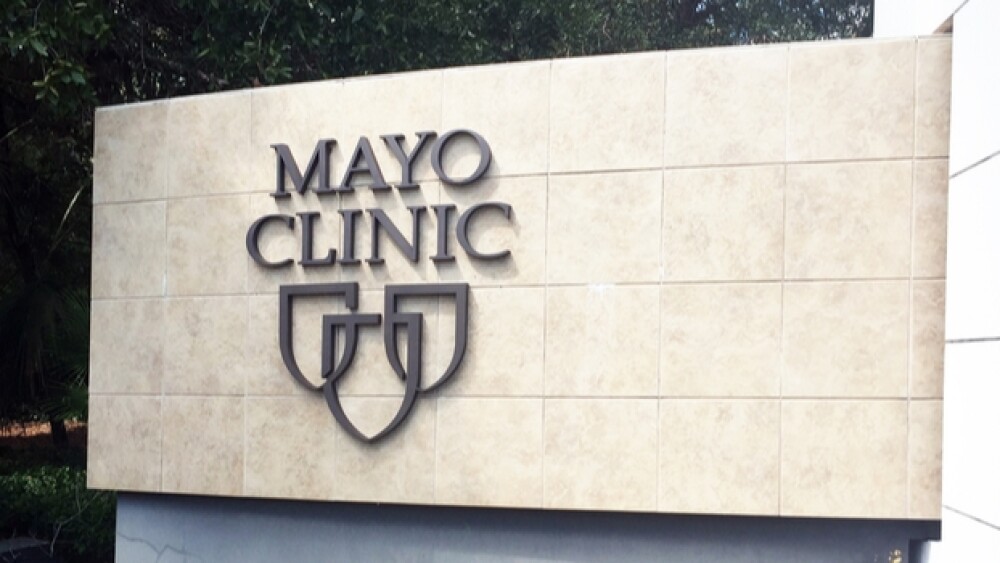Mayo Clinic announced Wednesday that it has launched two new tech venture companies designed to harness artificial intelligence (AI) and medical algorithms and create “software as medical devices” that clinicians can use to improve treatment across different diseases.
James R. Martin/Shutterstock
Mayo Clinic announced Wednesday that it has launched two new tech venture companies designed to harness artificial intelligence (AI) and medical algorithms and create “software as medical devices” that clinicians can use to improve treatment across different diseases.
The two new companies – Anumana Inc. and Lucem Health Inc. – were launched with a $30 million investment from the Mayo Clinic and its venture capital partners.
Anumana completed a $25.7 million Series A financing round, led by founding organizations nference and Mayo Clinic and in conjunction with Matrix Capital Management, Matrix Partners and NTTVC.
Lucem Health completed a $6 million Series A financing round prior to launch, led by founders Commure and Mayo Clinic.
In a Mayo Clinic statement, the two new tech ventures will work to deliver next-generation clinical decision support tools, diagnostic insights, and care recommendations. The AI and medical algorithms from the two companies will utilize Mayo Clinic’s medical knowledge, garnered by the organization’s patient records, to develop digital tools that will spur better treatment options for patients with various diseases.
The ventures will harness Mayo Clinic’s Remote Diagnostics and Management Platform (RDMP), which connects data with innovative novel AI algorithms and works to influence clinician decision-making to improve care.
“The dramatically increased use of remote patient telemetry devices coupled with the rapidly accelerating development of AI and machine learning algorithms has the potential to revolutionize diagnostic medicine,” said John Halamka, MD, President of the Mayo Clinic Platform. “With RDMP, clinicians will have access to best-in-class algorithms and care protocols and will be able to serve more patients effectively in remote care settings. The platform will also enable patients to take more control of their health and make better decisions based on insights delivered directly to them.”
Anumana will work to develop and commercialize new digital sensor diagnostic tools using a combination of nference’s AI and Mayo Clinic’s deep repository of medical data. Initially, the new venture will focus on developing state-of-the-art neural network algorithms, incorporating billions of heart health data from Mayo Clinic’s clinical data analytics platform. This work aims to uncover new biomedical knowledge regarding cardiovascular issues, thus facilitating early detection and better treatments for heart disease.
“For many conditions, such as a weak or thickened heart pump, or silent arrhythmias, effective evidence-based treatments exist that can prevent heart failure, stroke, or death,” said Paul Friedman, M.D., chair of Mayo Clinic’s Department of Cardiovascular Medicine. “The key is to detect the disease before symptoms develop to prevent these events from happening. The addition of AI to the ECG, a ubiquitous and inexpensive point-of-care test that is already integrated into medical workflows, makes this approach good for patients, convenient for clinicians, and massively scalable.”
Co-founder and CEO of nference and CEO of Anumana, Murali Aravamudan, added, “Our augmented intelligence technology, in the hands of scientific and clinical experts, will enable a comprehensive translation of the language of the heart. We think of it as the Rosetta Stone for cardiac medicine.”
Lucem Health was launched by Commure and Mayo clinic to provide the platform that will connect remote patient telemetry devices with algorithms enhanced by AI technology. Ultimately, the company plans to integrate any generated diagnostic insights from these algorithms into real-world clinical workflows.
“Lucem Health exists to help diagnostic medicine innovations see the light of day,” said Sean Cassidy, Lucem Health’s founding CEO. “We are excited to work with partners like Mayo Clinic and Anumana that are reimagining how we detect and treat diseases.”





